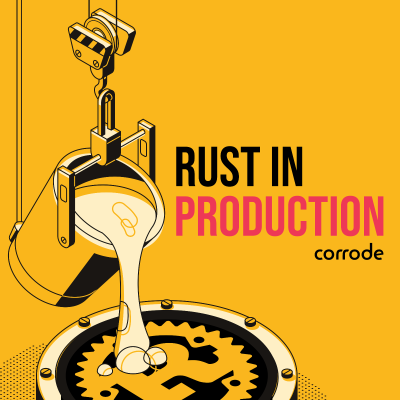
Rust in Production
inglés
Tecnología y ciencia
Empieza 7 días de prueba
$99 / mes después de la prueba.Cancela cuando quieras.
- 20 horas de audiolibros al mes
- Podcasts solo en Podimo
- Podcast gratuitos
Acerca de Rust in Production
This is "Rust in Production", a podcast about companies who use Rust to shape the future of infrastructure. We follow their journey in pursuit of more reliable and efficient software as they solve some of the most challenging technical problems in the world. Each episode dives deep into real-world applications of Rust, showcasing how this powerful systems programming language is revolutionizing the way we build and maintain critical infrastructure. From startups to tech giants, we explore the diverse landscape of organizations leveraging Rust's unique features to create safer, faster, and more scalable systems. Our guests share their experiences, challenges, and triumphs in adopting Rust for production environments. Listen in as we discuss topics such as concurrent programming, memory safety, performance optimization, and how Rust's ownership model contributes to building robust software systems. Whether you're a seasoned Rust developer, an infrastructure engineer, or a tech leader considering Rust for your next project, "Rust in Production" offers valuable insights and practical knowledge. Release Schedule "Rust in Production" releases new episodes every other Thursday at 4 PM UTC. Our podcast is structured into seasons, each featuring a diverse range of companies and experts in the Rust ecosystem. Recent episodes have included: - Season 2: Interviews with representatives from System76, Fusion Engineering, OxidOS, Matic, Thunderbird, AMP, and curl. - Season 1: Conversations with leaders from Sentry, Tweede Golf, Arroyo, Apollo, PubNub, and InfluxData. What You'll Learn - Real-world case studies of Rust implementation in production environments - Insights into how companies overcome technical challenges using Rust - Best practices for adopting Rust in various infrastructure contexts - The impact of Rust on software reliability, efficiency, and scalability - Future trends in systems programming and infrastructure development Join us as we uncover the latest trends in Rust development, explore best practices for using Rust in production, and examine how this language is addressing some of the most pressing issues in modern software engineering. From web services and databases to embedded systems and cloud infrastructure, we cover the full spectrum of Rust's impact on the tech industry.
Todos los episodios
42 episodiosGama Space with Sebastian Scholz
Space exploration demands software that is reliable, efficient, and able to operate in the harshest environments imaginable. When a spacecraft deploys a solar sail millions of kilometers from Earth, there's no room for memory bugs, race conditions, or software failures. This is where Rust's robustness guarantees become mission-critical. In this episode, we speak with Sebastian Scholz, an engineer at Gama Space, a French company pioneering solar sail and drag sail technology for spacecraft propulsion and deorbiting. We explore how Rust is being used in aerospace applications, the unique challenges of developing software for space systems, and what it takes to build reliable embedded systems that operate beyond Earth's atmosphere. About Gama Space Gama Space is a French aerospace company founded in 2020 and headquartered in Ivry-sur-Seine, France. The company develops space propulsion and orbital technologies with a mission to keep space accessible. Their two main product lines are solar sails for deep space exploration using the sun's infinite energy, and drag sails—the most effective way to deorbit satellites and combat space debris. After just two years of R&D, Gama successfully launched their satellite on a SpaceX Falcon 9. The Gama Alpha mission is a 6U cubesat weighing just 11 kilograms that deploys a large 73.3m² sail. With 48 employees, Gama is at the forefront of making space exploration more sustainable and accessible. About Sebastian Scholz Sebastian Scholz is an engineer at Gama Space, where he works on developing software systems for spacecraft propulsion technology. His work involves building reliable, safety-critical embedded systems that must operate flawlessly in the extreme conditions of space. Sebastian brings expertise in systems programming and embedded development to one of the most demanding environments for software engineering. Links From The Episode * GAMA-ALPHA [https://www.satcat.com/sats/55084] - The demonstration satellite launched in January 2023 * Ada [https://ada-lang.io/] - Safety-focused programming language used in aerospace * probe-rs [https://probe.rs/] - Embedded debugging toolkit for Rust * hyper [https://hyper.rs/] - Fast and correct HTTP implementation for Rust * Flutter [https://flutter.dev/] - Google's UI toolkit for cross-platform development * UART [https://en.wikipedia.org/wiki/Universal_asynchronous_receiver-transmitter] - Very common low level communication protocol * Hamming Codes [https://en.wikipedia.org/wiki/Hamming_code] - Error correction used to correct bit flips * Rexus/Bexus [https://en.wikipedia.org/wiki/Rexus/Bexus] - European project for sub-orbital experiments by students * Embassy [https://embassy.dev/] - The EMBedded ASsYnchronous framework * CSP [https://github.com/libcsp/libcsp] - The Cubesat Space Protocol * std::num::NonZero [https://doc.rust-lang.org/std/num/struct.NonZero.html] - A number in Rust that can't be 0 * std::ffi::CString [https://doc.rust-lang.org/std/ffi/struct.CString.html] - A null-byte terminated String * Rust in Production: KSAT [https://corrode.dev/podcast/s04e07-ksat/] - Our episode with Vegard about using Rust for Ground Station operations * Rust in Production: Oxide [https://corrode.dev/podcast/s03e03-oxide/] - Our episode with Steve, mentioning Hubris * Hubris [https://github.com/oxidecomputer/hubris] - Oxide's embedded operating system * ZeroCopy [https://docs.rs/zerocopy/latest/zerocopy/] - Transmute data in-place without allocations * std::mem::transmute [https://doc.rust-lang.org/std/mem/fn.transmute.html] - Unsafe function to treat a memory section as a different type than before Official Links * Gama Space Website [https://www.gamaspace.com/] * Gama Space on LinkedIn [https://www.linkedin.com/company/gamaspace/] * Gama Space on Crunchbase [https://www.crunchbase.com/organization/gama-22d7]
Radar with Jeff Kao
Radar processes billions of location events daily, powering geofencing and location APIs for companies like Uber, Lyft, and thousands of other apps. When their existing infrastructure started hitting performance and cost limits, they built HorizonDB, a specialized database which replaced both Elasticsearch and MongoDB with a custom single binary written in Rust and backed by RocksDB. In this episode, we dive deep into the technical journey from prototype to production. We talk about RocksDB internals, finite-state transducers, the intricacies of geospatial indexing with Hilbert curves, and why Rust's type system and performance characteristics made it the perfect choice for rewriting critical infrastructure that processes location data at massive scale. About Radar Radar is the leading geofencing and location platform, trusted by companies like Uber, Lyft, and thousands of apps to power location-based experiences. Processing billions of location events daily, Radar provides geofencing APIs, geocoding, and location tracking that enables developers to build powerful location-aware applications. Their infrastructure handles massive scale with a focus on accuracy, performance, and reliability. About Jeff Kao Jeff Kao is a Staff Engineer at Radar, where he led the development of HorizonDB, Radar's geospatial database written in Rust. His work replaced Elasticsearch and MongoDB with a custom Rust stack built on RocksDB, achieving dramatic improvements in performance and cost efficiency. Jeff has deep experience with geospatial systems and previously open-sourced Node.js TypeScript bindings for Google's S2 library. He holds a degree from the University of Waterloo. Links From The Episode * Radar Blog: High-Performance Geocoding in Rust [https://radar.com/blog/high-performance-geocoding-in-rust] - The blog post, which describes Radar's migration from Elasticsearch and MongoDB to Rust and RocksDB * FourSquare [https://foursquare.com/] - The compay Jeff worked at before * Ruby [https://www.ruby-lang.org/] - The basis for Rails * PagerDuty) [https://www.pagerduty.com/] - Another company Jeff worked at. Hes' been around! * CoffeeScript [https://coffeescript.org/] - The first big JavaScript alternative before TypeScript * Scala [https://www.scala-lang.org/] - A functional JVM based language * Wikipedia: MapReduce [https://en.wikipedia.org/wiki/MapReduce] - Distributed application of functional programming * Wikipedia: Algebraic Data Types [https://en.wikipedia.org/wiki/Algebraic_data_type] - The concept behind Rust's Enums, also present in e.g. Scala * Kotlin [https://kotlinlang.org/] - Easier than Scala, better than Java * Apache Lucene [https://lucene.apache.org/] - The core of ElasticSearch * Discord Blog: Why Discord is switching from Go to Rust [https://discord.com/blog/why-discord-is-switching-from-go-to-rust] - Always the #1 result in searches for Rust migrations * Radar Blog: Introducing HorizonDB [https://radar.com/blog/introducing-horizondb] - A really nice write up of Horizon's architecture * RocksDB [https://rocksdb.org/] - The primary storage layer used in HorizonDB * MyRocks [https://github.com/facebook/mysql-5.6] - A MySQL Storage Engine using RocksDB, written by Facebook * MongoRocks [https://github.com/mongodb-partners/mongo-rocks] - A MongoDB Storage Layer using RocksDB * CockroachDB [https://www.cockroachlabs.com/] - PostgreSQL compatible, distributed, SQL Database * InfluxDB [https://www.influxdata.com/] - A timeseries database that used RocksDB at one point, and our very first guest in this Podcast! * sled [https://github.com/spacejam/sled] - An embedded database written in Rust * rocksdb [https://github.com/rust-rocksdb/rust-rocksdb] - Rust bindings for RocksDB * H3 [https://h3geo.org/] - Uber's Geo Hashing using hexagons * S2 [https://s2geometry.io/] - Google's Geo Hashing library * Wikipedia: Hilbert Curve [https://en.wikipedia.org/wiki/Hilbert_curve] - A way to map 2 dimensions onto 1 while retaining proximity * Wikipedia: Finite-State Transducer [https://en.wikipedia.org/wiki/Finite-state_transducer] - A state machine used for efficiently looking up if a word exists in the data set * Rust in Production: Astral [https://github.com/corrode/corrode.github.io/blob/baea69ca7c7be643832a8970c635d98f312ecc18/podcast/s04e03-astral] - Our episode with Charlie Marsh about tooling for the Python ecosystem * burntsushi [https://github.com/BurntSushi] - A very prolific Rust developer, now working at Astral * fst [https://github.com/BurntSushi/fst] - FST crate from burntsushi * Wikipedia: Trie [https://en.wikipedia.org/wiki/Trie] - A tree-structure using common prefixes * Wikipedia: Levenshtein Distance [https://en.wikipedia.org/wiki/Levenshtein_distance] - The number of letters you have to change, add, or remove to turn word a into word b * tantivy [https://github.com/quickwit-oss/tantivy] - A full-text search engine, written in Rust, inspired by Lucene * LightGBM [https://github.com/microsoft/LightGBM] - A gradient boosted tree, similar to a decision tree * fastText [https://fasttext.cc/] - A text classification library from Meta * Wikipedia: Inverted Index [https://en.wikipedia.org/wiki/Inverted_index] - An index used for e.g. full text search * Wikipedia: Okapi BM25 [https://en.wikipedia.org/wiki/Okapi_BM25] - The ranking algorithm used in tantivy * Wikipedia: tf-idf [https://en.wikipedia.org/wiki/Tf%E2%80%93idf] - A classic and simple ranking algorithm * Roaring Bitmaps [https://github.com/RoaringBitmap/roaring-rs] - A very fast bitset library used in many places * corrode.dev: Be Simple [https://corrode.dev/blog/be-simple/] - A sentiment right down Matthias' alley * loco-rs [https://loco.rs/] - Rust on Rails Official Links * Radar [https://radar.com/] * Radar Blog [https://radar.com/blog] * Radar Documentation [https://radar.com/documentation] * Jeff Kao on LinkedIn [https://www.linkedin.com/in/jeff-kao/]
Holiday Episode
As we close the chapter on 2025 and celebrate our second year of 'Rust in Production', it's time to reflect on the highlights of the 17 episodes since our last holiday special. We looked at Rust from all angles, from cloud infrastructure to embedded systems, and from robotics to satellite technology. One thing that all these stories have in common is the passion and dedication of the Rust community to build faster, safer, and more reliable software. In this special episode, we look back at some of the memorable moments from the past year and celebrate Rust's achievements. This goes beyond the case studies we've covered; it's about the Rust community as a whole and the state of the Rust ecosystem at the end of 2025. Links from the Show: * Code.Talks Talk [https://www.youtube.com/watch?v=AkBnXrKmcvw] - Matthias' presentation on Rust case studies * Stack Overflow Developer Survey 2025 [https://survey.stackoverflow.co/2025/technology/#admired-and-desired] - Rust as most admired language since 1.0 release * Brave with Anton Lazarev (S03E07) [https://github.com/corrode/corrode.github.io/blob/cd03c9de4ef5e2d488b557f22334500099d69860/podcast/s03e07-brave] - Rust as the go-to language * Volvo with Julius Gustavsson (S03E08) [https://github.com/corrode/corrode.github.io/blob/cd03c9de4ef5e2d488b557f22334500099d69860/podcast/s03e08-volvo] - Empowering engineers * Astral with Charlie Marsh (S04E03) [https://github.com/corrode/corrode.github.io/blob/cd03c9de4ef5e2d488b557f22334500099d69860/podcast/s04e03-astral] - Welcoming community leads to huge impact * Scythe with Andrew Tinka (S05E02) [https://github.com/corrode/corrode.github.io/blob/cd03c9de4ef5e2d488b557f22334500099d69860/podcast/s05e02-scythe] - Confidence in what you build * Rust4Linux CVE [https://lore.kernel.org/all/2025121614-CVE-2025-68260-558d@gregkh/] - The first CVE in Rust for Linux * Greg KH post [https://social.kernel.org/notice/B1JLrtkxEBazCPQHDM] - Context on kernel CVE statistics * curl with Daniel Stenberg (S02E01) [https://github.com/corrode/corrode.github.io/blob/cd03c9de4ef5e2d488b557f22334500099d69860/podcast/s02e01-curl] - Bug reports every three hours, code constantly changes * curl statistics [https://mastodon.social/@bagder/115501681801742424] - How old code gets rewritten all the time * Tembo with Adam Hendel (S04E05) [https://github.com/corrode/corrode.github.io/blob/cd03c9de4ef5e2d488b557f22334500099d69860/podcast/s04e05-tembo] - Software is never done * Redis CVE-2025-49844 [https://redis.io/blog/security-advisory-cve-2025-49844/] - Remote code execution vulnerability from use-after-free * Canonical with John Seager (S05E05) [https://github.com/corrode/corrode.github.io/blob/cd03c9de4ef5e2d488b557f22334500099d69860/podcast/s05e05-canonical] - Ubuntu is optimistic about Rust * Rust in Android [https://security.googleblog.com/2025/11/rust-in-android-move-fast-fix-things.html] - Memory safety vulnerabilities below 20% * Android statistics [https://www.demandsage.com/android-statistics/] - 3.9 billion active devices worldwide * Roc with Richard Feldman (S05E04) [https://github.com/corrode/corrode.github.io/blob/cd03c9de4ef5e2d488b557f22334500099d69860/podcast/s05e04-roc] - Focus on the end user * Svix with Tom Hacohen (S04E02) [https://github.com/corrode/corrode.github.io/blob/cd03c9de4ef5e2d488b557f22334500099d69860/podcast/s04e02-svix] - Love it, but compile times... * Prime Video with Alexandru Ene (S05E01) [https://github.com/corrode/corrode.github.io/blob/cd03c9de4ef5e2d488b557f22334500099d69860/podcast/s05e01-prime-video] - Build times need to improve * crates.io [https://crates.io/] - 200 billion crate downloads and 200k published crates * Cloudflare with Kevin Guthrie and Edward Wang (S05E03) [https://github.com/corrode/corrode.github.io/blob/cd03c9de4ef5e2d488b557f22334500099d69860/podcast/s05e03-cloudflare] - Ecosystem is fantastic; thanks to all maintainers * Rust Conferences 2026 [https://github.com/corrode/corrode.github.io/blob/cd03c9de4ef5e2d488b557f22334500099d69860/blog/rust-conferences-2026] - Complete list of upcoming Rust conferences * CodeCrafters Course [https://www.youtube.com/watch?v=aZ5sfhGmEVU] - Build your own HTTP server in Rust * Rust Project Goals [https://blog.rust-lang.org/2025/12/16/Project-Goals-2025-November-Update.md/] - November update on 41 active project goals * cargo-script RFC [https://github.com/rust-lang/cargo/issues/12207] - Run Rust scripts without full Cargo projects * Better pin ergonomics RFC [https://github.com/rust-lang/rust-project-goals/issues/389] - Improving async Rust ergonomics * KSAT with Vegard Sandengen (S04E07) [https://github.com/corrode/corrode.github.io/blob/cd03c9de4ef5e2d488b557f22334500099d69860/podcast/s04e07-ksat] - Make async better * 1Password with Andrew Burkhart (S04E06) [https://github.com/corrode/corrode.github.io/blob/cd03c9de4ef5e2d488b557f22334500099d69860/podcast/s04e06-1password] - Make it easier to learn Rust * Rust Book by Brown University [https://rust-book.cs.brown.edu/] - Interactive learning resource for Rust * Clippy lints [https://rust-lang.github.io/rust-clippy/master/index.html] - All available linter rules for Rust * C++ and Rust interop [https://github.com/rust-lang/rust-project-goals/blob/main/src/2025h2/interop-problem-map.md] - Safer language interoperability initiative * Microsoft with Victor Ciura (S04E01) [https://github.com/corrode/corrode.github.io/blob/cd03c9de4ef5e2d488b557f22334500099d69860/podcast/s04e01-microsoft] - C++ doesn't have to die for Rust to succeed * BorrowSanitizer initiative [https://borrowsanitizer.com/] - LLVM instrumentation for detecting aliasing violations * Polonius [https://github.com/rust-lang/rust-project-goals/issues/118] - Next-generation borrow checker * Rust with Niko Matsakis (S04E04) [https://github.com/corrode/corrode.github.io/blob/cd03c9de4ef5e2d488b557f22334500099d69860/podcast/s04e04-rust] - Be excellent to each other (Bill & Ted reference)
Rust4Linux with Danilo Krummrich
Bringing Rust into the Linux kernel is one of the most ambitious modernization efforts in open source history. The Linux kernel, with its decades of C code and deeply ingrained development practices, is now opening its doors to a memory-safe language. It's the first time in over 30 years that a new programming language has been officially adopted for kernel development. But the journey is far from straightforward. In this episode, we speak with Danilo Krummrich, Linux kernel maintainer and Rust for Linux core team member, about the groundbreaking work of integrating Rust into the Linux kernel. Among other things, we talk about the Nova GPU driver, a Rust-based successor to Nouveau for NVIDIA graphics cards, and discuss the technical challenges and cultural shifts required for large-scale Rust adoption in the kernel as well as the future of the Rust4Linux project. About Rust for Linux Rust for Linux is a project aimed at bringing the Rust programming language into the Linux kernel. Started to improve memory safety and reduce vulnerabilities in kernel code, the project has been gradually building the infrastructure, abstractions, and tooling necessary for Rust to coexist with the kernel's existing C codebase. About Danilo Krummrich Danilo Krummrich is a software engineer at Red Hat and a core contributor to the Rust for Linux project. His fundamental contribution to Rust for Linux is the driver-core infrastructure, the foundational framework that makes it possible to write drivers in Rust at all. This includes both C and Rust code that provides the core abstractions for device drivers in the kernel. Danilo is a maintainer for multiple critical kernel subsystems, including Driver Core, DRM (GPUVM, Rust, GPU Scheduler), GPU drivers for NVIDIA GPUs (Nova, Nouveau), Firmware Loader API, as well as Rust bindings for PCI, DMA, and ALLOC. He is the primary developer of the Nova GPU driver, a fully Rust-based driver for modern NVIDIA GPUs. Links From The Episode * AOSP [https://source.android.com/] - The Android Open Source Project * Kernel Mailing Lists [https://lore.kernel.org/] - Where the Linux development happens * Miguel Ojeda [https://ojeda.dev/] - Rust4Linux maintainer * Wedson Almeida Filho [https://github.com/wedsonaf] - Retired Rust4Linux maintainer * noveau driver [https://docs.kernel.org/gpu/nouveau.html] - The old driver for NVIDIA GPUs * Vulkan [https://en.wikipedia.org/wiki/Vulkan] - A low level graphics API * Mesa [https://www.mesa3d.org/] - Vulkan and OpenGL implementation for Linux * vtable [https://en.wikipedia.org/wiki/Virtual_method_table] - Indirect function call, a source of headaches in nouveau * DRM [https://docs.kernel.org/gpu/introduction.html] - Direct Rendering Manager, Linux subsystem for all things graphics * Monolithic Kernel [https://en.wikipedia.org/wiki/Monolithic_kernel] - Linux' kernel architecture * The Typestate Pattern in Rust [https://cliffle.com/blog/rust-typestate/] - A very nice way to model state machines in Rust * pinned-init [https://crates.io/crates/pinned-init] - The userspace crate for pin-init * rustfmt [https://github.com/rust-lang/rustfmt] - Free up space in your brain by not thinking about formatting * kunit [https://docs.kernel.org/dev-tools/kunit/index.html] - Unit testing framework for the kernel * Rust core crate [https://doc.rust-lang.org/stable/core/index.html] - The only part of the Rust Standard Library used in the Linux kernel * Alexandre Courbot [https://github.com/Gnurou] - NVIDIA employed co-maintainer of nova-core * Greg Kroah-Hartman [http://www.kroah.com/linux/] - Linux Foundation fellow and major Linux contributor * Dave Airlie [https://github.com/airlied] - Maintainer of the DRM tree * vim [https://www.vim.org/] - not even neovim * mutt [http://www.mutt.org/] - classic terminal e-mail client * aerc [https://aerc-mail.org/] - a pretty good terminal e-mail client * Rust4Linux Zulip [https://rust-for-linux.com/contact#zulip-chat] - The best entry point for the Rust4Linux community Official Links * Rust for Linux GitHub [https://github.com/Rust-for-Linux] * Danilo Krummrich on GitHub [https://github.com/dakr] * Danilo Krummrich on LinkedIn [https://www.linkedin.com/in/danilo-krummrich-796885153/]
Canonical with Jon Seager
What does it take to rewrite the foundational components of one of the world's most popular Linux distributions? Ubuntu serves over 12 million daily desktop users alone, and the systems that power it, from sudo to core utilities, have been running for decades with what Jon Seager, VP of Engineering for Ubuntu at Canonical, calls "shaky underpinnings." In this episode, we talk to Jon about the bold decision to "oxidize" Ubuntu's foundation. We explore why they're rewriting critical components like sudo in Rust, how they're managing the immense risk of changing software that millions depend on daily, and what it means to modernize a 20-year-old operating system without breaking the internet. About Canonical Canonical is the company behind Ubuntu, one of the most widely-used Linux distributions in the world. From personal desktops to cloud infrastructure, Ubuntu powers millions of systems globally. Canonical's mission is to make open source software available to people everywhere, and they're now pioneering the adoption of Rust in foundational system components to improve security and reliability for the next generation of computing. About Jon Seager Jon Seager is VP Engineering for Ubuntu at Canonical, where he oversees the Ubuntu Desktop, Server, and Foundations teams. Appointed to this role in January 2025, Jon is driving Ubuntu's modernization strategy with a focus on Communication, Automation, Process, and Modernisation. His vision includes adopting memory-safe languages like Rust for critical infrastructure components. Before this role, Jon spent three years as VP Engineering building Juju and Canonical's catalog of charms. He's passionate about making Ubuntu ready for the next 20 years of computing. Links From The Episode * Juju [https://juju.is/] - Jon's previous focus, a cloud orchestration tool * GNU coretuils [https://www.gnu.org/software/coreutils/] - The widest used implementation of commands like ls, rm, cp, and more * uutils coreutils [https://github.com/uutils/coreutils] - coreutils implementation in Rust * sudo-rs [https://github.com/trifectatechfoundation/sudo-rs] - For your Rust based sandwiches needs * LTS [https://en.wikipedia.org/wiki/Long-term_support] - Long Term Support, a release model popularized by Ubuntu * coreutils-from-uutils [https://git.launchpad.net/~juliank/+git/coreutils-from/tree/debian/coreutils-from-uutils.links?h=main] - List of symbolic links used for coreutils on Ubuntu, some still point to the GNU implementation * man: sudo -E [https://manpages.ubuntu.com/manpages/questing/en/man8/sudo.8.html#:~:text=%2DE%2C%20%2D%2Dpreserve%2Denv] - Example of a feature that sudo-rs does not support * SIMD [https://en.wikipedia.org/wiki/Single_instruction%2C_multiple_data] - Single instruction, multiple data * rust-coreutils [https://packages.ubuntu.com/questing/rust-coreutils] - The Ubuntu package with all it's supported CPU platforms listed * fastcat [https://endler.dev/2018/fastcat/] - Matthias' blogpost about his faster version of cat * systemd-run0 [https://www.freedesktop.org/software/systemd/man/devel/run0.html] - Alternative approach to sudo from the systemd project * AppArmor [https://apparmor.net/] - The Linux Security Module used in Ubuntu * PAM [https://github.com/linux-pam/linux-pam] - The Pluggable Authentication Modules, which handles all system authentication in Linux * SSSD [https://sssd.io/] - Enables LDAP user profiles on Linux machines * ntpd-rs [https://github.com/pendulum-project/ntpd-rs] - Timesynchronization daemon written in Rust which may land in Ubuntu 26.04 * Trifecta Tech Foundation [https://trifectatech.org/] - Foundation supporting sudo-rs development * Sequioa PGP [https://sequoia-pgp.org/] - OpenPGP tools written in Rust * Mir [https://mir-server.io/] - Canonicals wayland compositor library, uses some Rust * Anbox Cloud [https://canonical.com/anbox-cloud] - Canonical's Android streaming platform, includes Rust components * Simon Fels [https://github.com/morphis] - Original creator of Anbox and Anbox Cloud team lead at Canonical * LXD [https://canonical.com/lxd] - Container and VM hypervisor * dqlite [https://canonical.com/dqlite] - SQLite with a replication layer for distributed use cases, potentially being rewritten in Rust * Rust for Linux [https://rust-for-linux.com/] - Project to add Rust support to the Linux kernel * Nova GPU Driver [https://rust-for-linux.com/nova-gpu-driver] - New Linux OSS driver for NVIDIA GPUs written in Rust * Ubuntu Asahi [https://ubuntuasahi.org/] - Community project for Ubuntu on Apple Silicon * debian-devel: Hard Rust requirements from May onward [https://lists.debian.org/debian-devel/2025/10/msg00285.html] - Parts of apt are being rewritten in Rust (announced a month after the recording of this episode) * Go Standard Library [https://pkg.go.dev/std] - Providing things like network protocols, cryptographic algorithms, and even tools to handle image formats * Python Standard Library [https://docs.python.org/3/library/] - The origin of "batteries included" * The Rust Standard Library [https://doc.rust-lang.org/stable/std/index.html#what-is-in-the-standard-library-documentation] - Basic types, collections, filesystem access, threads, processes, synchronisation, and not much more * clap [https://github.com/clap-rs/clap] - Superstar library for CLI option parsing * serde [https://serde.rs/] - Famous high-level serilization and deserialization interface crate Official Links * Canonical [https://canonical.com/] * Ubuntu [https://ubuntu.com/] * Jon Seager's Website [https://jnsgr.uk/] * Jon's Blog: Engineering Ubuntu For The Next 20 Years [https://jnsgr.uk/2025/02/engineering-ubuntu-for-the-next-20-years/] * Canonical Blog [https://canonical.com/blog] * Ubuntu Blog [https://ubuntu.com/blog] * Canonical Careers: Engineering [https://canonical.com/careers/engineering] - Apply your Rust skills in the Linux ecosystem
Elige tu suscripción
Premium
20 horas de audiolibros
Podcasts solo en Podimo
Podcast gratuitos
Cancela cuando quieras
Empieza 7 días de prueba
Después $99 / mes
Empieza 7 días de prueba. $99 / mes después de la prueba. Cancela cuando quieras.





































